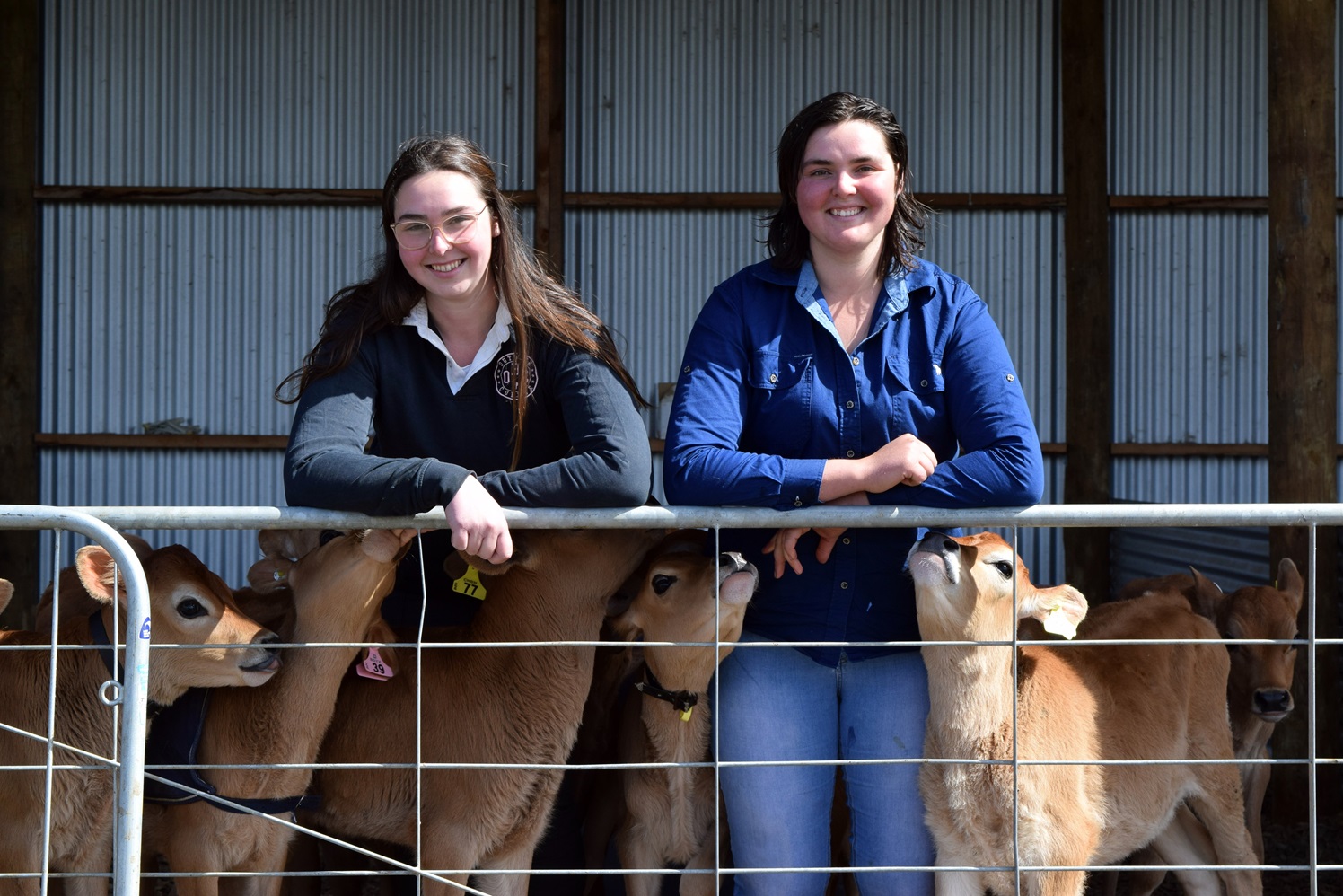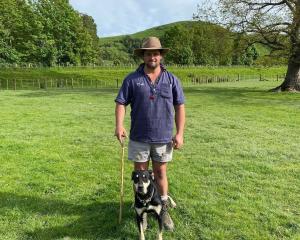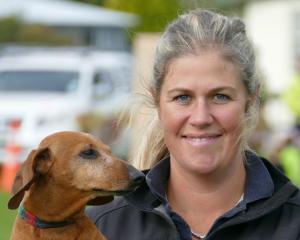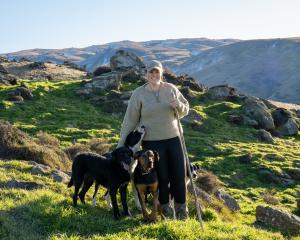
Western Southland siblings Alannah and Julie Skedgwell are fourth generation pedigree Jersey breeders. They talk to Shawn McAvinue about succession, working together and their future aspirations.
Sisters Alannah and Julie Skedgwell believe they will be written out of their parents' will if they ever bring home Friesian cattle to their dairy farm in Western Southland.
Alannah, 22, and Julie, 21, are fourth generation pedigree Jersey breeders and moved home to work and live on their family farm Mount Brook Jerseys with their parents Murray Skedgwell and Linsey Bennett.
Both sisters are now minor shareholders in the business and owned more than a quarter of the cows on the farm.
Julie said she and her sister worked well together.
"Generally, we are pretty good," Julie said.
Alannah focussed on the cows and heifers and Julie on calf rearing.
"As long as we stick to our areas, there’s not too many clashes," Alannah said.

"You always have your odd spat in those high pressure days in the spring time. Sometimes you have to go off and do your own thing for 10 minutes and cool off," Julie said.
"Who are we going to complain to? Mum? She’d be like ‘cut it out you two’." .
"Or ‘I’ll bang your heads together’," Alannah laughed.
The family were working on a succession plan.
Both sisters expected their parents to remained involved in the operation in their retirement.
"They’ll be coming down every day to have a look, because that’s been their passion since they were kids," Alannah said.
Their great-grandparents and grandparents on both sides of the family bred pedigree Jersey cattle.
Their father was raised in Taranaki and their mother was raised in Tuatapere, and they met at a Purebred Jersey Society conference.
"Both sides of the family were trying to get mum and dad together — the two young people," Julie said.
The pair "clicked" and their father moved himself and his cows from Taranaki to Western Southland, Alannah said.
Both their parents run pedigree Jersey studs, their mother runs Elmsbrook stud and their father runs Mount Lake stud.
After working on the Bennett family farm for a couple of years, their parents bought a sheep and beef farm and converted it to Mount Brook Jerseys in 1997.
The couple farmed between Mount Brook and the Bennett family farm.

Automatic cup removers were installed in the shed about two years ago to reduce the number of people needed at milking time.
Cows had feed available in the shed since 2009, a mix of wheat, distiller's dried grains, rolled barley and palm kernel.
The in-shed feeding had increased milk production.
Cows were eating more in-shed this season due to wet weather impacting grass growth and limited silage and baleage available to buy in Southland.
"You’ve got to feed them something if there is no grass in the paddock," Alannah said.
The family was targeting producing about 450kg of milksolids per cow in 260 days of lactation this season.
Milk production was 17% up on the same time last year.
If they hit the target, it would be the most milksolids put in the vat in a season.
The target had lifted due to more cows being milked and production increasing per cow due to improved herd management including introducing new genetics.
Another improvement on farm was buying a 77ha run-off block in Groveburn, about 7km away, about two years ago.
Young stock was run on the block.
"It is quite nice up there, it is a steep and rolling contour surrounded by native bush and you can hear all the birdlife — it is very peaceful."
An increase in milk production had allowed the sisters to both enter the business.
A free stall winter barn, including rubber mating for the cows to lie on, was built in 2008.
The barn could house all the cows on the farm.
"We are spoilt," Alannah said.
The shed means they never have cows on winter crops.
"Which is good for the environment and good for us," Alannah said.
She praised her parents for the foresight to build a winter shed, at a time when construction costs were cheaper and there was less red tape required to get it built, Alannah said.
"It has certainly set me and Julz up in a better position."
Both sisters run their own pedigree Jersey studs — Alannah runs Elmslake stud and Julie runs Mount Brook stud.
The pedigree of all the stud cattle could be traced back to the first pure Jersey cattle imported to New Zealand in the 1800s.
Neither sister got to choose their stud name, Julie said.
"The names were given to us before we were born," Julie said.
Alannah said if they had been given a choice on what type of cattle to breed, they probably would have chosen Jersey anyway.
The four studs were milked as one herd.
Bulls were bred from top-producing cows and traded for bulls from other Jersey studs across New Zealand to introduce new genetics.
Traits they chased in their breeding programmes included good legs and feet to ensure they could walk to the milking shed twice a day.
Alannah said she assessed each cow to identify which traits were needed to breed a better calve.
"We use a lot of different bulls which brings a lot of different things to the table," Alannah said.
The rest of their Jersey bulls were sold at weaning to repeat clients to put over their heifers, Julie said.
Alannah said an appeal of a Jersey bull was how it made calving easier for cows due to it having a smaller frame than other breeds.
"They definitely have their advantages, they’re more efficient and you don’t have to feed them as much to get relevant production for their size."
Julie agreed.
"They are good in the wet and the cold and they look after themselves and they are good in a drought."
Their lighter-coloured coats meant they had a higher heat tolerance than other breeds, she said.
Summer crops were planted on Mount Brook Jerseys to mitigate any feed shortages during dry seasons.
More rain had fallen this year than normal including nearly 200mm last month, Julie said.
Calves started arriving in early August and had been kept in the shed to give paddocks time to dry out.
"They’re still babies and you have to look after them," Alannah said.
The farm lies near Waiau River and a terrace protects it from flooding.
Neither sister had ever considered working in any other industry than agriculture.
"I don’t think either of us could sit behind a desk," Alannah said.
The sisters had never considered farming anywhere else than Western Southland.
"I don’t want to leave my wintering shed and because we have been here so long we know the farm like the back of our hand. There probably are easier places to farm, but it is our little patch of dirt and it suits us well," Alannah said.
The sisters show cows, calves and yearlings at A&P shows to continue a family tradition.
"There is a healthy rivalry between us and our parents," Alannah said.
Julie said she had a very different taste in Jersey cattle than her sister, so the shows could settle a difference in opinion.
The shows gave them a chance to compare their cattle to those of other Jersey breeders.
Their cattle were also entered in competitions judged on-farm, which was easier than entering them in A&P shows.
"All you have to do is wash them up and put them in a paddock," Alannah said.
Both sisters were qualified to judge at cattle competitions.
Judging engagements for both sisters included an on-farm competition in Australia, covering 3000km by car between Victoria and Queensland, in October last year.
"That was a good experience," Alannah said
An idea of winter milking up to 100 cows in a few years had been floated, Alannah said.
Empty cows were carried over winter so winter milking would allow them to continue production.
Possible disadvantages of winter milking includes a need for more supplementary feed to give to their cows in the barn.
"You can’t have them out in the paddock if it is hailing sideways, which is often what happens in Southland in winter."
Winter milking would require an approval from Environment Southland so the idea was an "aspiration" at the moment, Alannah said.
Another aspiration was putting smart collars on their cows so any health issues could be detected before a cow showed any symptoms.
"It would improve animal welfare, which is really important to us. We know all of our cows by their name."















